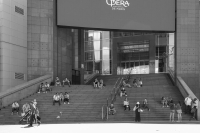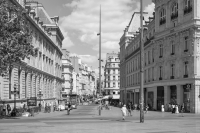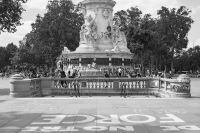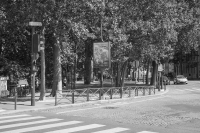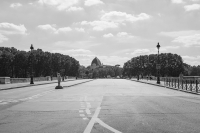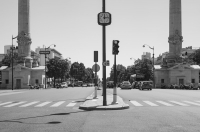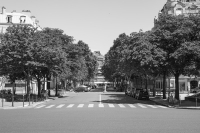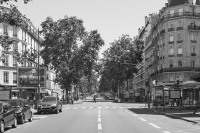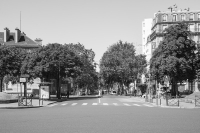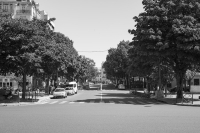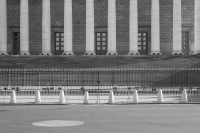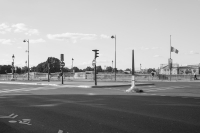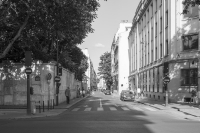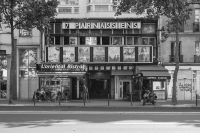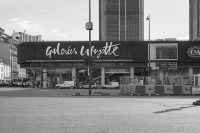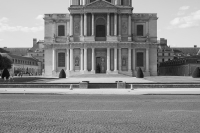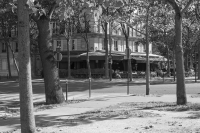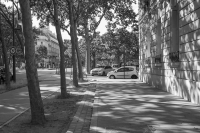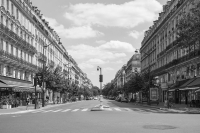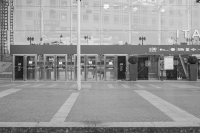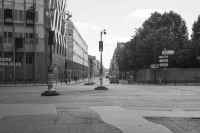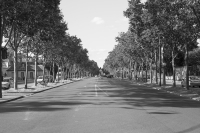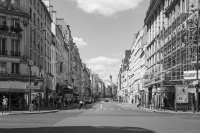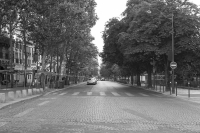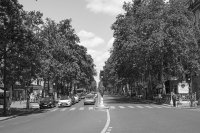[EN]
Ucratia, 2016
Hi omnes lingua, institutis, legibus inter se differunt.
(Gaius Iulius Caesar, Bellum Gallicum)
“Ucratia”
Greek neologism, introduced at the beginning of the twenty-first century, based on the mode of “utopia,” combining the negative [u-] and [krátos], “power,” instead of [topos], meaning “place.” Etymologically, therefore, the word means a “non-power,” either an incumbent power that is aberrant or illegitimate, or a desirable political regime that is yet to come. In fiction, “ucratia” is a genre relating to the principle of critical rewriting of political history.
Protocol
Created during the “summer break,” the series broaches some of the key issues in French politics during the spring and summer of 2016: the demonstrations against the Loi Travail (Labor law) and Nuit Debout (“Up all night”) movement. Uchronically—several weeks or months after the events—, the images of this process of “de-enactment” retrace the main events of the various protest movements between April and July and the continuous occupation of the Place de la République. The standpoint is that of the subject-protester; the vanishing point is centered on the choreography carried out by the police—barrages, cordons, and kettling tactics set up by the police, gendarmes, and CRS (riot police), who blocked the way to entrances, squares, and buildings, in perfect alignment with the topography of Haussmann’s Paris, as “capital of the nineteenth-century.” The images are presented in the uchronological order of the events to which they refer.
Translation from French by JD-Trad (Jon & David Michaelson)
[FR]
Ucratie, 2016
Hi omnes lingua, institutis, legibus inter se differunt.
(Gaius Iulius Caesar, Bellum Gallicum)
« Ucratie »
Néologisme grec du début du XXIe siècle, fondé sur le modèle d’ « utopie », avec un [u-] de négation et [krátos], « pouvoir », au lieu de [topos], « lieu ». Étymologiquement, le mot désigne donc un « non-pouvoir » : soit un pouvoir en place aberrant ou illégitime, soit un régime politique désirable, mais qui n’existe pas encore. Dans la fiction, l’ucratie est un genre qui repose sur le principe de la réécriture critique de l’Histoire politique.
Protocole
Réalisée pendant la « trêve estivale », la série revient sur certains des lieux marquants de l’actualité politique française du printemps et de l’été 2016, à savoir le mouvement de contestation de la loi travail et Nuit Debout. De manière uchronique, quelques semaines ou mois après les faits, les images de ce processus de de-enactment retracent le pas des différentes manifestations entre avril et juillet ainsi que l’occupation continue de la place de la République. Le point de vue est celui du sujet manifestant ; le point de fuite est centré sur la chorégraphie exécutée par les forces de l'ordre – barrages, cordons et nasses de policiers, gendarmes et CRS qui obstruent passage ou accès, place ou édifice, épousant au passage parfaitement la topographie du Paris haussmannien, capitale du XIXe siècle. Les images sont présentées dans l'ordre uchronologique des événements auxquels elles se réfèrent.
(extrait du projet photographique publié in les gens d’Uterpan, Uchronie. Sternberg press, Berlin, 2017)
